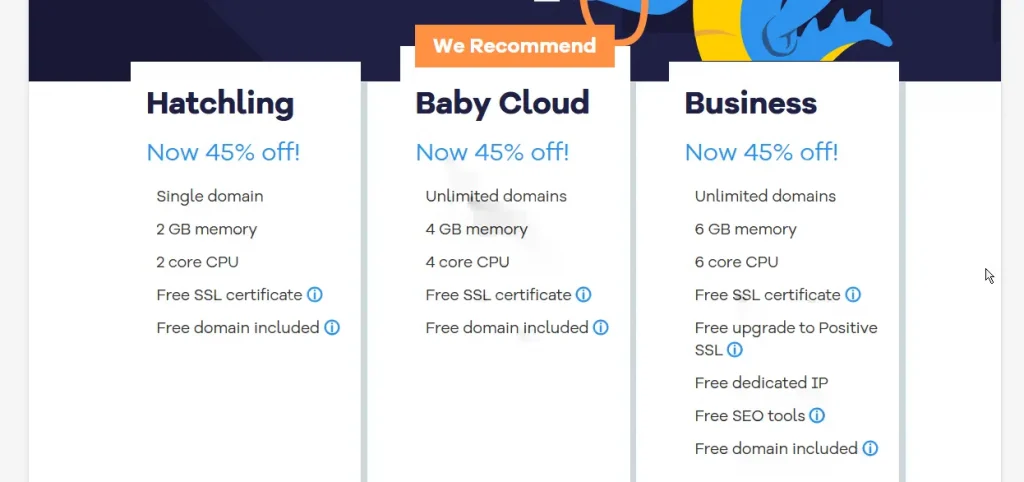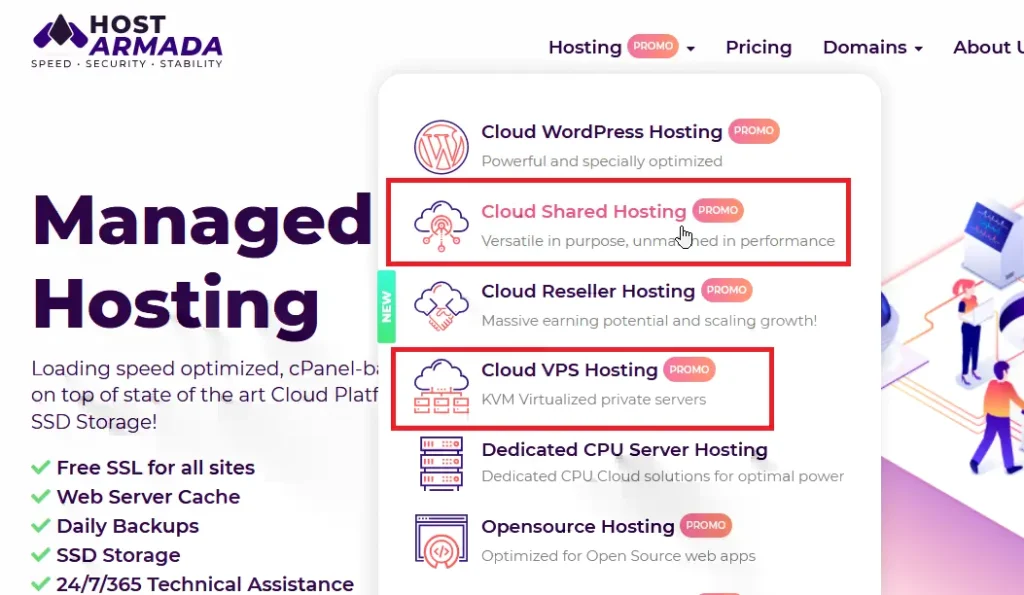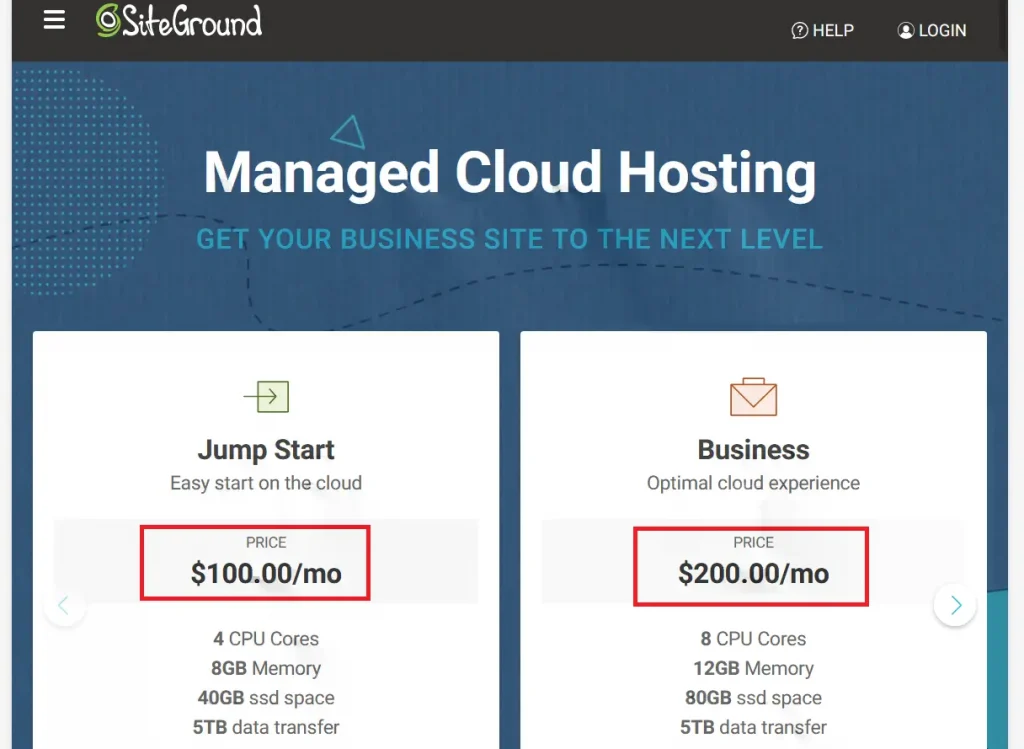Here’s a list of cheap cloud hosting providers. There are two sections – shared cloud and VPS cloud hosting.
| Basic | Advanced | Premium | Super Premium | |
|---|---|---|---|---|
| Hostgator Cloud Hosting (Hostgator Cloud Hosting Review) |
$4.95/month
|
$6.57/month
|
$9.95/month
|
|
| HostArmada Cloud Hosting (HostArmada Cloud Hosting Review) |
$2.99/month
|
$4.49/month
|
$5.39/month
|
|
|
NameHero Cloud Hosting (NameHero Review) |
$3.58/month
|
$4.53/month
|
$6.98/month
|
$10.48/month
|
| Liquid Web Cloud Sites (Cloud Sites Review) |
$51/month
|
|||
| Cloud VPS Hosting |
||||
| A2 Cloud Hosting | $4.99/month | $9.99/month | $34.99/month | |
| NameHero VPS | $21.97/month | $27.47/month | $40.12/month | |
| SiteGround Cloud Hosting (SiteGround Cloud Hosting Review) |
$100/month | $200/month | $300/month | $400/month |
| InMotion Cloud Hosting | $17.99/month
|
$32.99/month
|
$52.99/month
|
|
| India Plans |
||||
| Hostgator India Cloud Hosting | ₹699.5/month
|
₹479/month
|
₹839/month
|
|
Because of the way the word “cloud” is used, there are two types of cloud hosting. I’ve explained the difference below.
Cheapest Cloud Hosting Coupon
Need to make a decision fast? Click below for the maximum discount today:
Provider: Hostgator with US-based servers
Duration: 3 years
Discount: 45%
Coupon (Click to copy):
Table of Contents:
Cheap and Expensive Cloud Hosting
Cloud hosting is split into two kinds:
- Cheap cloud hosting
- Expensive cloud hosting
Cheap cloud hosting is nothing but shared hosting or slightly better. Expensive cloud hosting is nothing but a VPS. The word “cloud” comes from the fact that the resources are not tied down to a single machine but spread out among a cluster.
Cheap Cloud Hosting Examples
Here are a couple of examples of cheap cloud hosting.
Hostgator Cloud
A great example of cheap cloud hosting is Hostgator. You can see in my review of Hostgator US-based cloud hosting, that it’s superior to Hostgator’s ordinary shared hosting. It has more resources and includes features like dynamic and static data caching. It also includes the ability to add more resources to your hosting, which you can’t do with shared hosting. As a result, it’s more expensive than ordinary web hosting.
Hostgator has taken its cloud hosting service away from the main navigation bar on top, but they still keep a link to it at the bottom. You can see from the screenshot that they market it differently:

With ordinary shared hosting, Hostgator doesn’t mention RAM, CPU, or GBs of memory. The fact that they do this with their cloud services proves that they position it differently. We don’t normally think of Hostgator as being innovative, but they’ve genuinely managed to differentiate their cheap cloud hosting services from ordinary shared hosting.
HostArmada Cloud Shared Hosting
HostArmada is another web host that uses the “cloud” terminology to talk about shared hosting. Here’s a screenshot of all their products using the “cloud” keyword:

You can see that for them, everything is “the cloud”. This is somewhat justified since they have a huge number of data centers all over the world. So while you can just host from one location at a time, that’s what they call their vast network of servers. HostArmada has provided quite popular for hosting from countries like India, which have usually been starved for good options.
NameHero Cloud Hosting
NameHero exemplifies how cloud hosting is different from ordinary shared hosting. Yes, you’re on a shared server with other accounts. But unlike normal shared hosting, you get a ton of features such as:
- LiteSpeed Web Server (What is LiteSpeed?)
- Dynamic page caching
- Automatic and manual backups with on-demand restore
- Free malware scanning
- QUIC.cloud integration
- Great reseller support
The plans aren’t as cheap as something you’d get from Hostgator – even though the initial discount is high enough to make you think otherwise. But you get what you pay for, and with NameHero, you get a lot.
A2 Hosting Cloud – Just an Unmanaged VPS
With A2 Hosting’s cloud service, unlike Hostgator, you just get a VPS. As proof, here’s a screenshot of the checkout screen when signing up for a cloud package with A2:

As you can see, they’re not even trying to hide the fact that their “cloud” hosting is just an unmanaged VPS. Unlike Hostgator, the A2 Hosting cloud package is for experienced developers, and not ordinary shared hosting customers. Despite that, it’s extremely cheap. But then you can get a lot of cheap VPS providers if you shop around.
Premium Cloud Hosting
Some providers have gone in the opposite direction and have made cloud hosting a premium product. SiteGround and Liquid Web are two prominent examples.
SiteGround Cloud
The SiteGround cloud is more like a VPS than a cloud, though formally the SiteGround VPS is the GoGeek plan. You can provision resources like RAM, CPU, and disk space, and manage all of it through SiteGround’s managed cPanel. They have some of the most expensive cloud products on the market.
Here’s a screenshot of the SiteGround cloud hosting page:

You can see that these plans have nothing in common with cloud hosting on other sites like Hostgator and A2 Hosting. These are much closer to dedicated servers, except that your sites are hosted on a cluster, instead of single machines. This means you can expand and contract the resources based on your needs. SiteGround has fully committed to the “cloud” branding. They no longer even have a section about VPS services. And when I talked about how they used to market their GoGeek plan as a VPS, they tried to make me take it down.
Liquid Web Cloud Sites
The other example of premium cloud services is Liquid Web. Their product is called “Cloud Sites” and here’s a review of Cloud Sites. Liquid Web got rid of their shared hosting a while back, and in place of it, Cloud Sites seems to be the closest counterpart.
Cloud Sites comes closer to the spirit of cloud hosting than any other company’s products
But it’s very different from regular shared hosting. Instead, you can use it as a one-stop shop for unlimited sites with a 1 TB bandwidth allocation. It’s a premium offering in that it’s more expensive even than SiteGround, but promises top-quality customer support, first-class hardware, and blazing fast speeds.
The unique thing about Cloud Sites is that you pay a fixed price and Liquid Web guarantees the speed regardless of how many sites you host. Keep in mind that it’s rather expensive – the cost is easily more than any VPS and more than many dedicated servers. So you should be able to host dozens of sites on it without skipping a beat. Liquid Web promises that you only have to worry about storage space and bandwidth. You don’t have to care about things like CPU and bandwidth. This comes closer to the spirit of “cloud hosting” than any other company on this list.
No Bluehost Cloud Hosting
Initially, this page used to also have Bluehost cloud hosting prices. However, sometime in 2018, Bluehost decided to retire its “cloud” platform and it now redirects everything to its shared hosting page.
This follows a trend across the industry started by GoDaddy, which was one of the first to get rid of “cloud hosting” as a separate package. Here’s a beginner’s explanation of the differences between cloud and shared hosting.
Even Hostgator’s cloud platform is less visible than it was before. Even though it’s available, it’s no longer a “top menu” item. Meaning that they too are de-emphasizing it. I don’t think they’re going to drop it all together like Bluehost however.
Benefits of Cloud Hosting – What to Expect
These are the theoretical benefits of the cloud. In reality, many providers simply tag the word “Cloud” onto their regular hosting plans and expect people to believe them. For example, GoDaddy no longer offers cloud-based products, but when they did, it was pretty meaningless. The cloud prices comparison table above adheres to the distinction between “VPS” and “Cloud”.
If you’re going cloud hosting price shopping, here is what you should demand from your hosting provider.
Easily Provision More or Less Resources
A key benefit of the cloud is that your resources aren’t static. Instead, you can change your RAM and hard disk requirements as the demand for your site increases or decreases. Providers like SiteGround do this automatically, and others require you to manually adjust the available resources.
Some like InMotion make no distinction between the “Cloud” and “VPS” servers. Their VPS servers are spread out over multiple machines, so to them, it’s the same thing.
Protected from Failure
With the cloud, the days of a server being down due to a hardware failure are over. Your site is stored on multiple servers in different locations. Even an entire data center shutdown should not bring your site down, as it’ll just pick up from elsewhere.
This is where I feel conglomerates like EIG have an edge over traditional hosting companies. The conventional wisdom today is that EIG ruins companies by purchasing hosting providers and “corporatizing” them. There might be truth to that – there might not. There’s no hard data on this. However, purchasing so many providers gives EIG members an unmatched pool of data centers around the globe that they can tap in to enhance their cloud-based offerings. That’s also perhaps why EIG has some of the cheapest cloud hosting plans.
I expect this aspect of EIG to keep growing in the future.
You WON’T Get Geolocation and Edge Delivery from the Cloud
Ideally, cloud hosting means that your site and data are spread out across multiple servers around the country, or even the world. Say it’s located on two servers in the US – one on the east coast, and the other on the west coast. Geolocation means that your hosting provider should deliver your site from the server that’s closest to any given customer.
Unfortunately, no provider does this. Instead, they simply spread your data across a few locations (sometimes just two) and don’t deliver content to users based on their location. In my opinion, this is a must for any “cloud” hosting package. Especially for the cheap cloud hosting plans on this page, there’s no way they can deliver this functionality.
This functionality is being developed through another breed of service providers. Cloudflare and QUIC.cloud are offering dynamic content caching that can take your hosting to the next level. But you won’t get that from traditional hosting providers.
Summary
I don’t know how much longer cheap cloud hosting products are going to be available as standalone services. They’re being increasingly merged into VPS packages, or are evolving into sophisticated premium niche services. But there are still some genuine cloud providers out there, who use the term as a souped-up form of shared hosting with more resources, and better reliability – like Hostgator.

